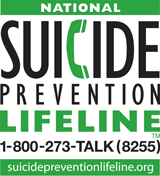Suicide is a serious and preventable public health problem that can have lasting harmful effects on individuals, families, and communities. While the causes of suicide vary, suicide prevention strategies share two goals: to reduce factors that increase risk and to increase factors that promote resilience or coping. Prevention requires a comprehensive approach that occurs at all levels of society—from the individual, family, and community levels to the broader social environment. Effective prevention strategies are needed to promote awareness of suicide, while also promoting prevention, resilience, and a commitment to social change.
CDC’s Preventing Suicide: A Technical Package of Policies, Programs, and Practices pdf icon[6 MB, 62 Pages, 508] highlights strategies based on the best available evidence to help states and communities prevent suicide. The strategies and their corresponding approaches are listed in the table below.
Preventing Suicide |
|
|---|---|
Strategy |
Approach |
| Strengthen economic supports |
|
| Strengthen access and delivery of suicide care |
|
| Create protective environments |
|
| Promote connectedness |
|
| Teach coping and problem-solving skills |
|
| Identify and support people at risk |
|
| Lessen harms and prevent future risk |
|
See Suicide Resources for articles and publications about prevention strategies for suicide.

Contact the National Suicide Prevention Lifeline
- Call 1-800-273-TALK (1-800-273-8255)
- Use the online Lifeline Crisis Chat.
Both are free and confidential. You’ll be connected to a skilled, trained counselor in your area.
For more information, visit the National Suicide Prevention Lifeline.
Original source: https://www.cdc.gov/violenceprevention/suicide/prevention.html